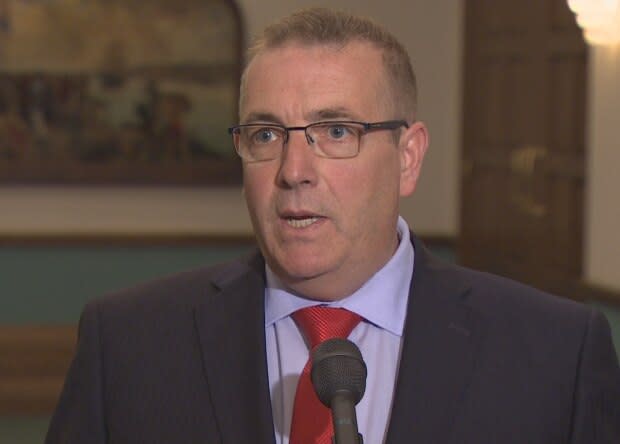N.L. ferries made 4,100 trips with no passengers last year
Ferries in Newfoundland made 4,100 trips without a single passenger last year — even before the COVID-19 pandemic hit the province.
In total, more than 10 per cent of the nearly 38,000 runs made by the province's 12 intraprovincial ferry services were empty in the 2019-20 fiscal year, which ended at the beginning of March.
And when the most travelled routes — the Bell Island, Fogo Island and Blanc-Sablon-St. Barbe ferries — are excluded, the number of trips taken with no passengers jumps to one in five.
Ferries serving sparsely populated areas of southern Newfoundland, as well as the ferry to Little Bay Islands, a town resettled at the end of 2019, made the most trips with zero passengers.
The Gaultois-McCallum-Hermitage ferry travelled empty about 30 per cent of the time.
Another south coast route, the Rencontre East-Bay L'Argent-Pool's Cove ferry, as well as the Southeast Bight-Petite Forte run, carried no passengers other than their crew every one in five trips.
By comparison, the Bell Island, Fogo Island and Blanc-Sablon-St. Barbe routes made empty trips less than five per cent of the time and transported, on average, far more passengers.
Service cuts on the horizon: minister
Transportation and Works Minister Steve Crocker said it's normal for ferries to make a small number of empty runs. Sometimes, when a boat leaves its home port with several passengers aboard, there's no one to meet it on the other side. Crocker also said several ferries serve more than one community, which can contribute to empty trips.
The minister said, however, the high incidence of zero-passenger trips on certain routes has to change, and residents should expect cuts in regions where ferry schedules don't line up with demand.

Crocker said the province has already launched two requests for proposals to "modernize" the south coast routes. But in both cases, the costs of the proposals government received were too expensive.
"From what we've seen so far in the previous two RFPs … to make this work within our fiscal capacity, we would certainly have to decrease the number of vessels," he said. "Any time that you find a situation where you actually decrease the number of vessels involved, obviously, the schedule is certainly going to look different."
Crocker gave no further details on service reductions, but he said he hopes to have changes in place by the time the current south coast ferry contract is up next March.
He also said local ferry committees are aware of the government's plans and that the Department of Transportation and Works will have "conversations with the community but we do realize that there are going to have to be changes made."
'We need governments to speak truthfully to people'
Memorial University political scientist Russell Williams said he's watched for years as successive governments have hesitated to navigate the "torturous" waters surrounding ferry service reform. He said the province has long faced a situation where fares and schedules don't reflect demand or operational costs.

In 2019-20, the Newfoundland and Labrador government budgeted $70.5 million in operating costs for its 12 ferry services, but expected to recoup just $8 million — 11 per cent of those expenses — through ticket fees.
The situation in Rencontre East, where the ferry ran with zero passengers 20 per cent of the time last year, illustrates the problem. A resident of that town could board the MV Terra Nova, a boat capable of carrying 20 passengers, paying as little as $3.75, and travel 41 kilometres to Bay L'Argent.
According to the province's budget estimates, operating costs for that vessel were north of $1.6 million, which averages out to more than $1,000 per trip.
Williams said after years of hesitation, the government must now grapple with an unsustainable ferry system amid a "ruinous" financial crunch — huge debt levels, an unfinished and over-budget megaproject and tanking oil royalties.
"They've led people to believe that the current level of fees and level of service is sustainable into the future. And it probably isn't," Williams said. "The challenge here is that we need governments to speak truthfully to people about what is possible and what isn't possible."
'This is our TCH'
Andrew Baker, who worked as a cook aboard the Rencontre East-Bay L'Argent-Pool's Cove ferry until last April, said the the boat is a "lifeline" for Rencontre East — its sole connection, most times, to the rest of Newfoundland.
The ferry brings medicine, mail and food. It also transports the ambulance.
"Any time there's a story, it could be a bigger ferry like the Bell Island one, there's always people who say get rid of the ferries," Baker said. "For places that are serviced by them, it's kind of a kick in the gut."
Daniel Veilleux, a resident and former mayor on Long Island, another community that relies on ferry service, said, "You can't forget that this is our TCH. It's our main road."
"No one has to pay to take the TCH," said Veilleux.

Veilleux said there's no silver bullet to slashing ferry costs. Reducing runs saves fuel, but a large portion of operating costs are salaries.
"The only thing they'll save is the cost of fuel, of the diesel. The crews will be paid regardless, and the [generator] motors keep running," he said.
The province must also pay for vessel upkeep and maintenance, regardless of how often the boats run, both Veilleux and Crocker said.
Operations reduced during pandemic
The provincial government has already reduced schedules for its ferries due to the pandemic and restrictions on non-essential travel, as traffic dropped significantly on all vessels in March and mid-April because of it.
Data obtained by Radio-Canada shows between the beginning of March and April, zero-passenger trips jumped on all routes. About 60 per cent of trips on both the Rencontre East–Bay L'Argent–Pool's Cove and Gaultois–McCallum–Hermitage ferries were empty.
And while the province slowly looks toward its economic recovery after the pandemic, Crocker said costs related to the intraprovincial ferry system, like other government services, will be closely examined.
"Without a doubt, the model, the fees, all of that will certainly be something for the conversations that we're going to have to have in the near future," Crocker said.
Read more from CBC Newfoundland and Labrador


